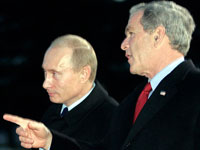Putin and Bush start exchanging scathing remarks again
U.S. President George W. Bush criticized the Russian administration for the heavy hand in breaking up weekend opposition demonstrations held against President Vladimir Putin.

Separately, U.S. officials vigorously denied Putin's weekend allegations that the United States was behind the decision made by international election observers not to monitor Russian elections coming a few months from now.
Bush expressed deep concern over the detention of political leaders, including former international chess champion Garry Kasparov during the weekend in Moscow, Saint Petersburg and two other Russian cities. "The freedoms of expression, assembly and press, as well as due process, are fundamental to any democratic society," he said.
"I am particularly troubled by the use of force by law enforcement authorities to stop these peaceful activities and to prevent some journalists and human rights activists from covering them," Bush said in a statement. "I am hopeful that the government of Russia will honor its international obligations in these areas, investigate allegations of abuses and free those who remain in detention."
Putin's comments blaming the United States for the decision by the Organization for Security and Cooperation in Europe stung officials in the State Department, who insisted Putin's allegations were false even though U.S. officials did visit the OSCE's Office for Democratic Institutions and Human Rights about the Russian voting.
"According to the information we have, once again this was done at the advice of the U.S. State Department, and we will take this into account in our relations with that country," reports quoted Putin as saying, referring to the Organization for Security and Cooperation in Europe's decision not to send observers.
The tough statement reflected a growing chill in Moscow's relations with Washington. It also appeared to send a strong warning that any U.S. criticism of the vote would be unacceptable.
"The Department of State's message was very clear that this was ODIHR'S decision to make," said Assistant Secretary of State Daniel Fried, one of two ranking department officials in the delegation to the Vienna-based organization. The other was Undersecretary of State Nicholas Burns.
"At no time did we directly, indirectly, not through nuance, not through pressure, anything; in no way did we try to steer them," Fried said. "I said, `It's not our role to try to steer you."'
The department's official spokesman, Sean McCormack, had the same message: "Our message was very, very clear, and there should be no mistaking this: that this was a decision entirely for the OSCE. Whatever they decided, whether to send the mission or not to send the mission, that was going to be entirely up to them.
The OSCE election monitoring office announced its decision on Nov. 16 not to send an observer mission to monitor Russia's election because Moscow had taken too long to issue visas and had created other obstacles including restricting the size of the mission to 70 people. Far more observers would have been needed, it said.
"This was not about United States, it was not about U.S.-Russia relations; it was about Russia and its elections," Fried told The Associated Press.
In another development, Russian Foreign Minister Sergey Lavrov met privately at the State Department Monday before a meeting of the so-called Quartet working to bring an Israeli-Palestinian settlement in the Middle East. Russia and the United States are joined in the Quartet by the European Union and the United Nations.
Asked whether Rice would raise the Putin-OSCE issue with Lavrov, Fried said he did not know, but "she knows about it."
Subscribe to Pravda.Ru Telegram channel, Facebook, RSS!


